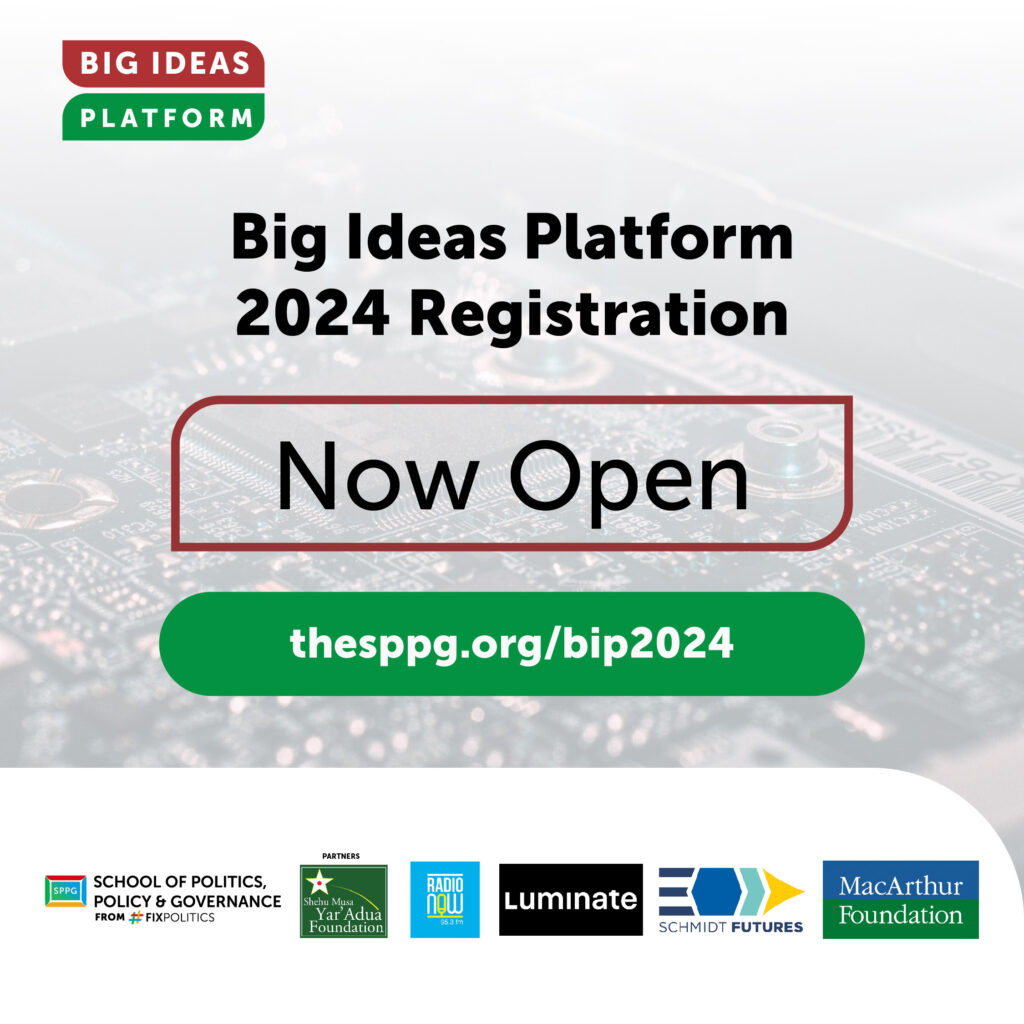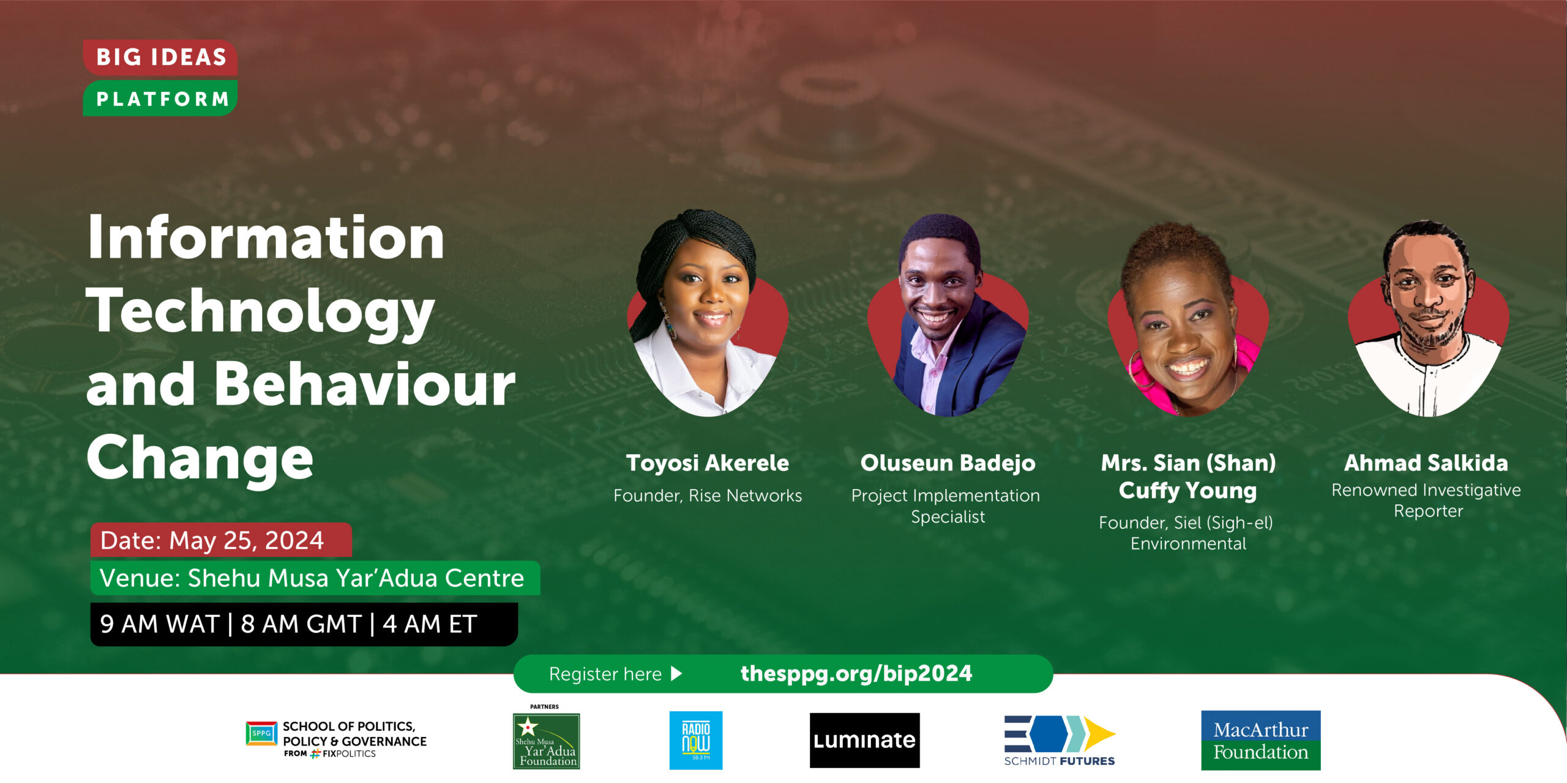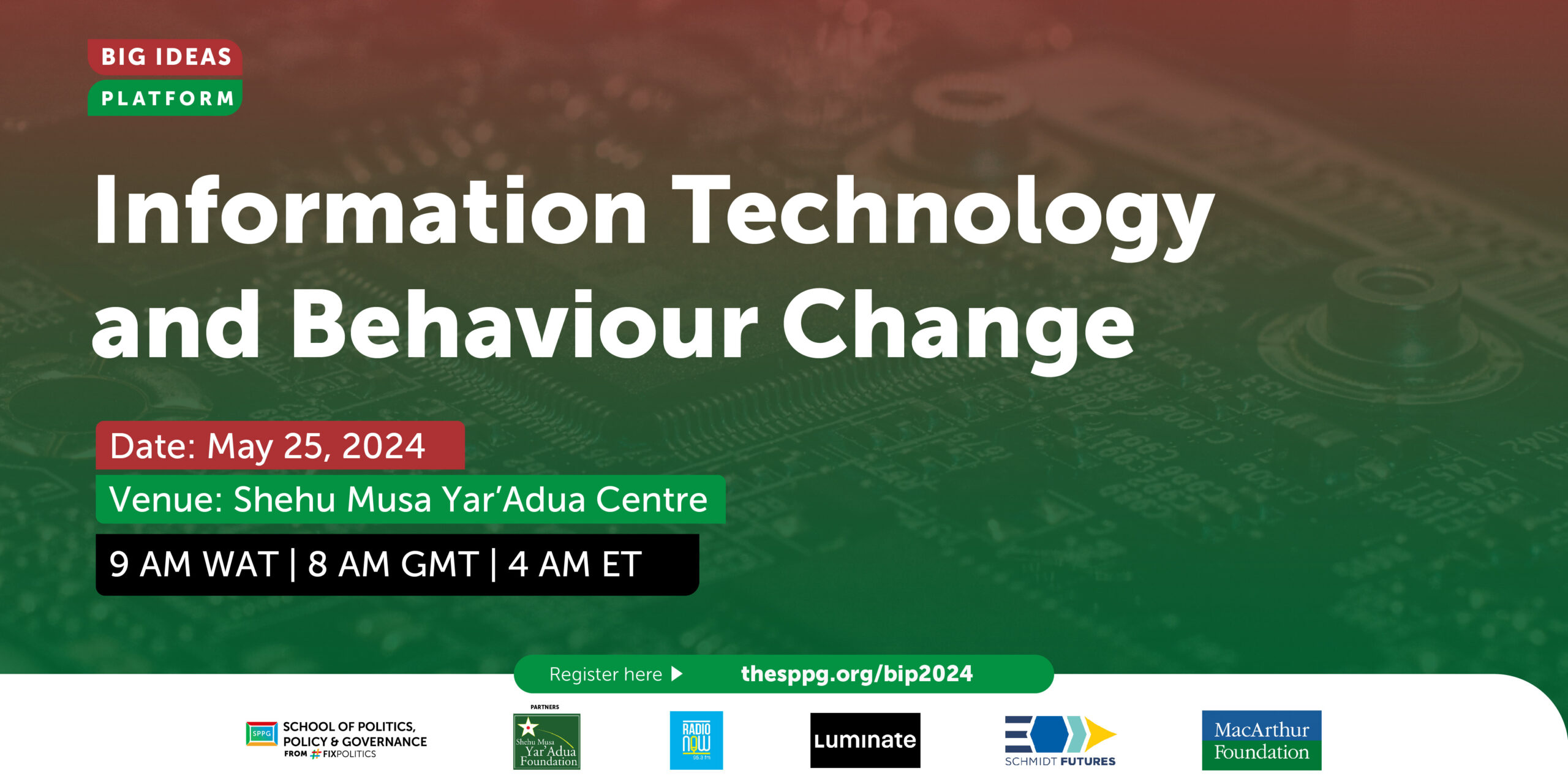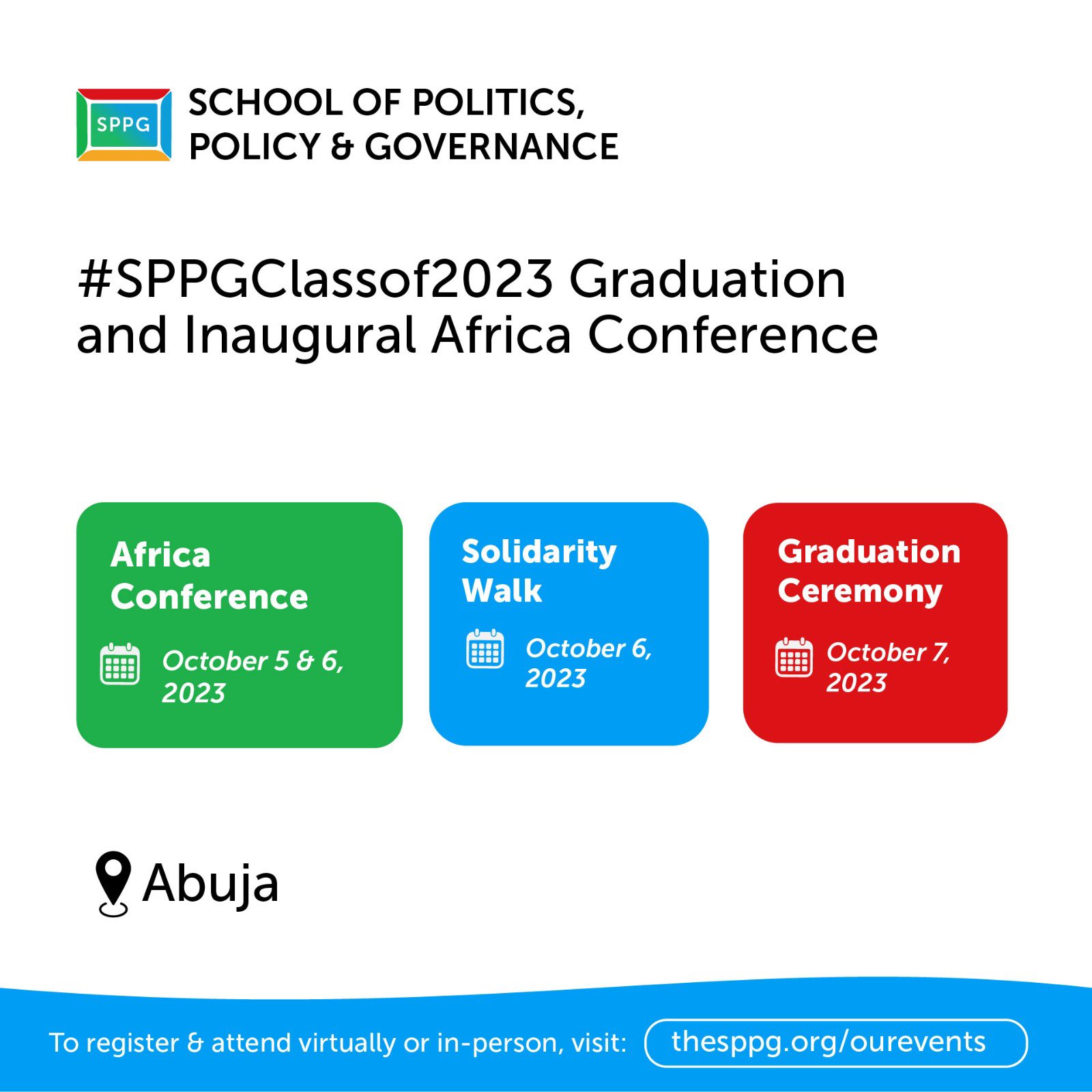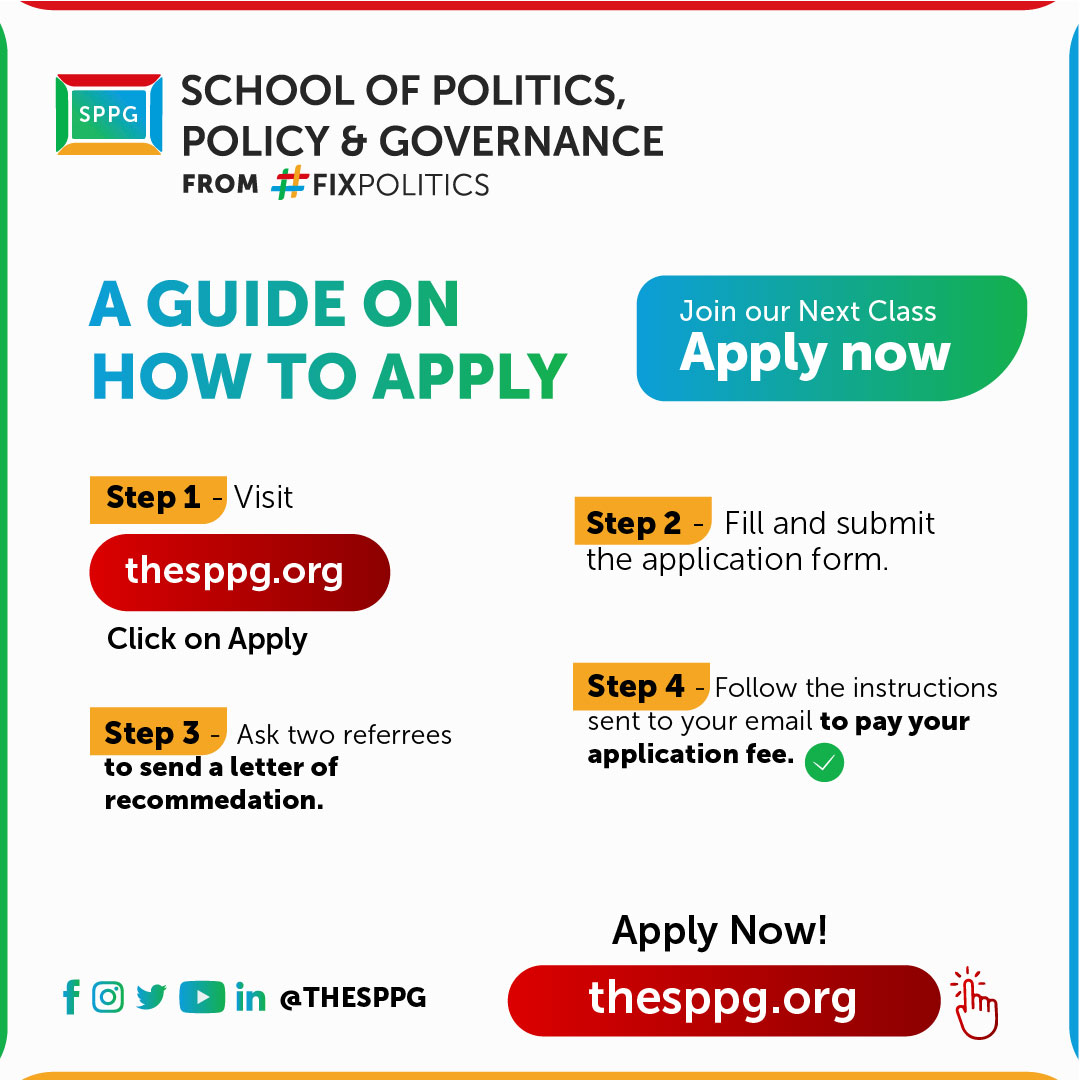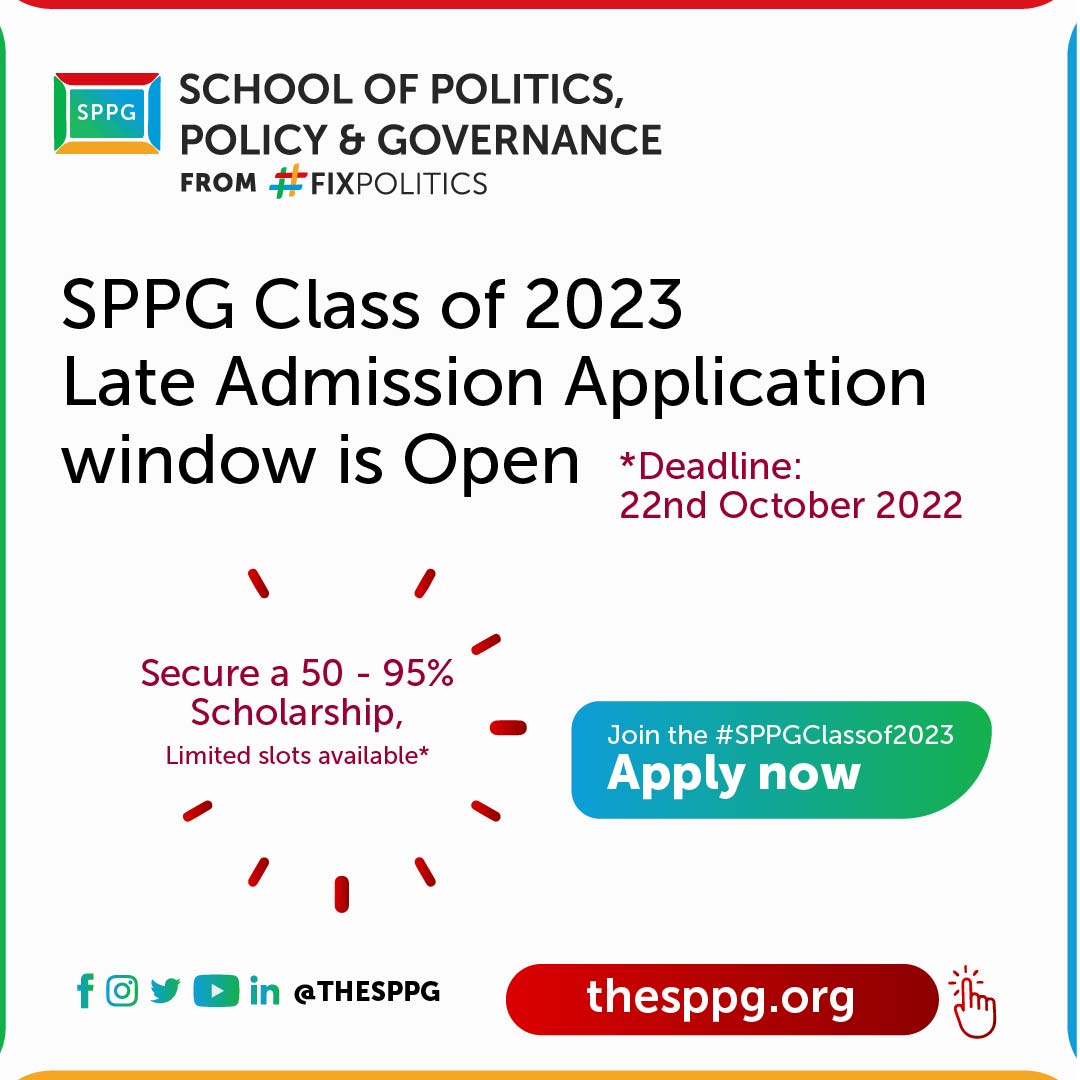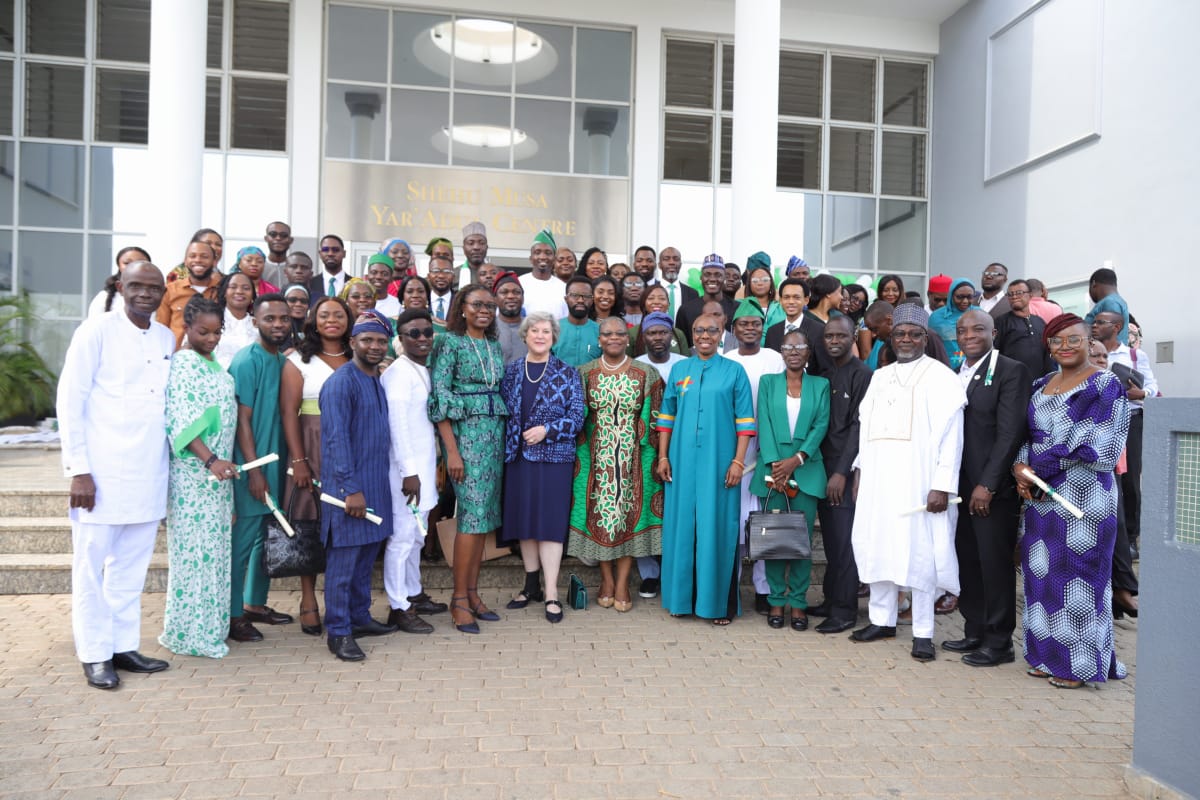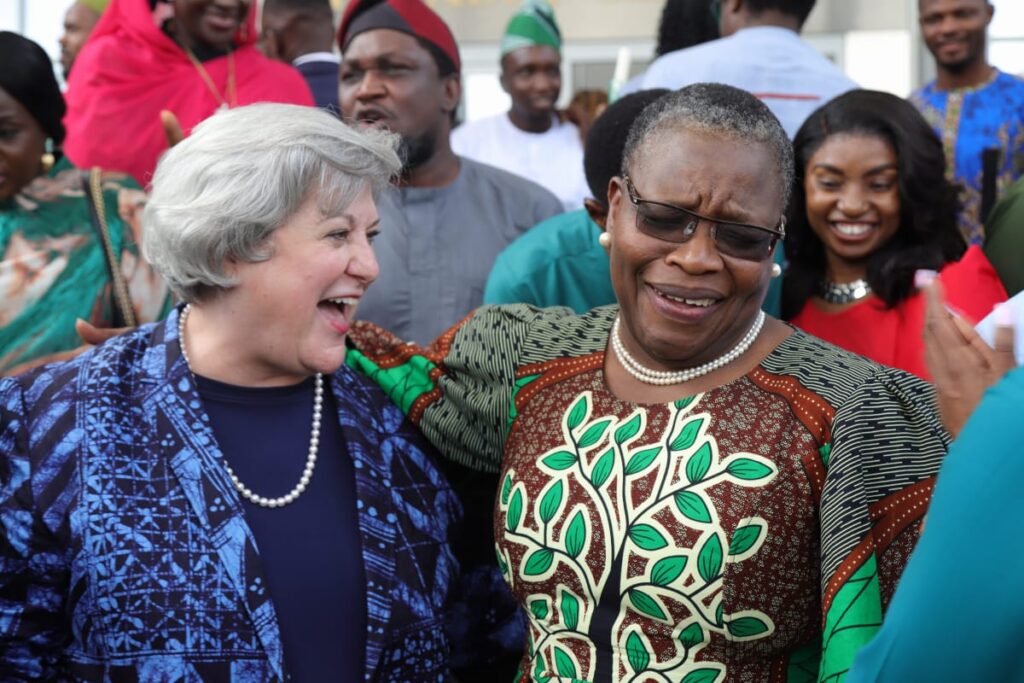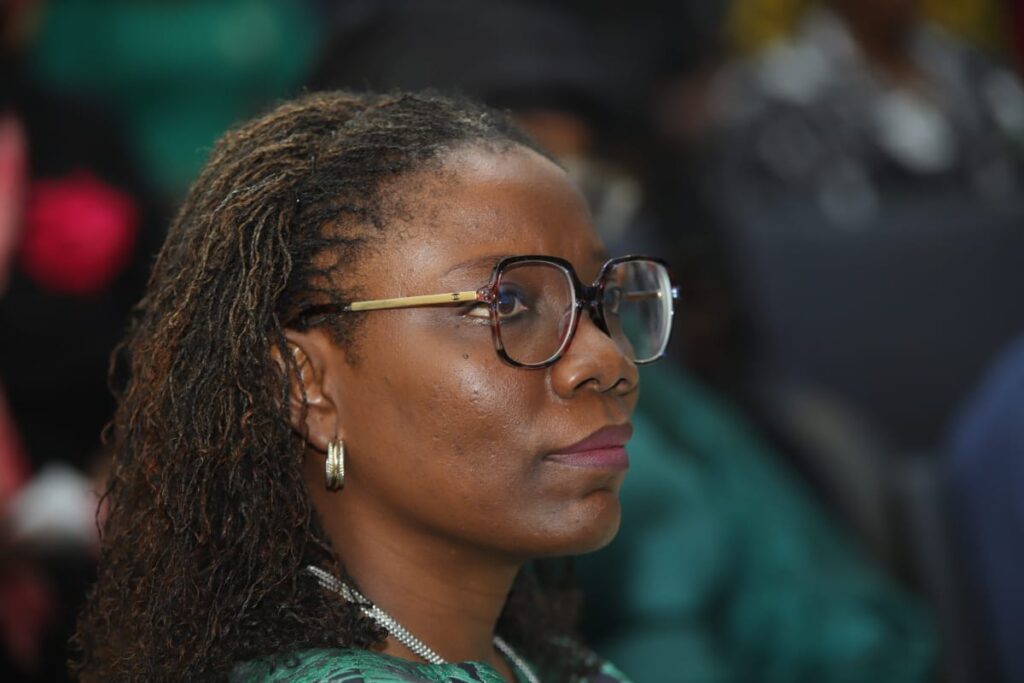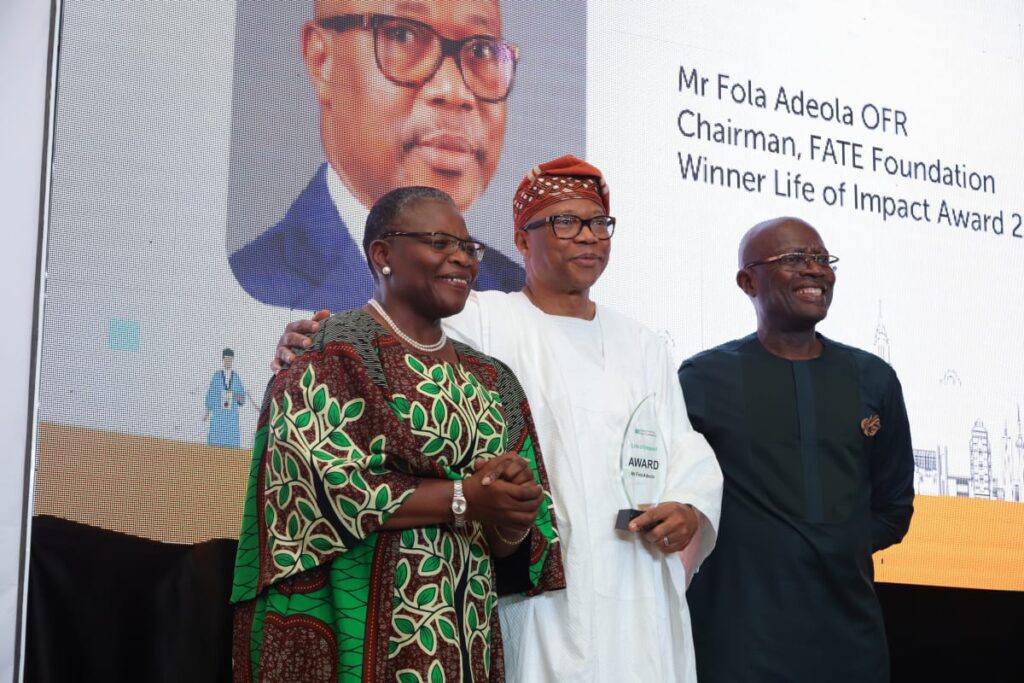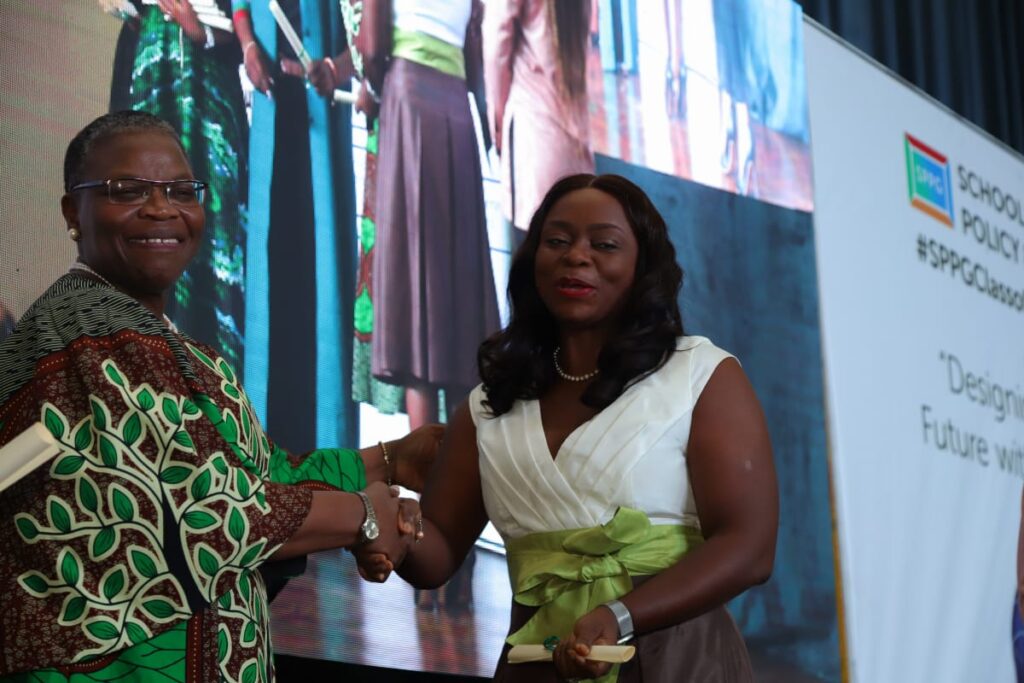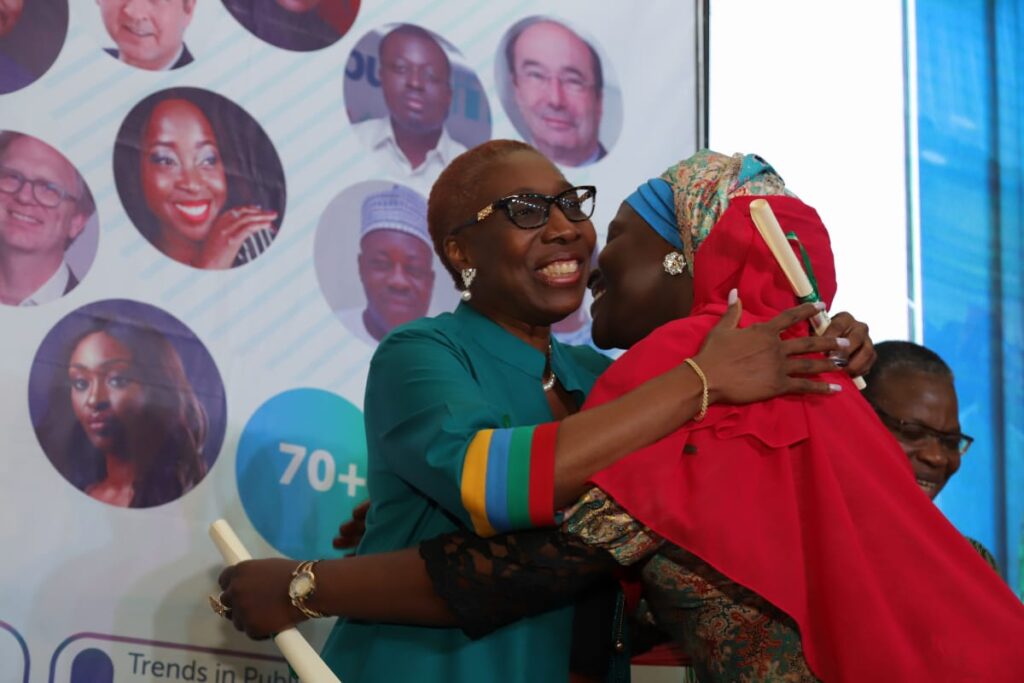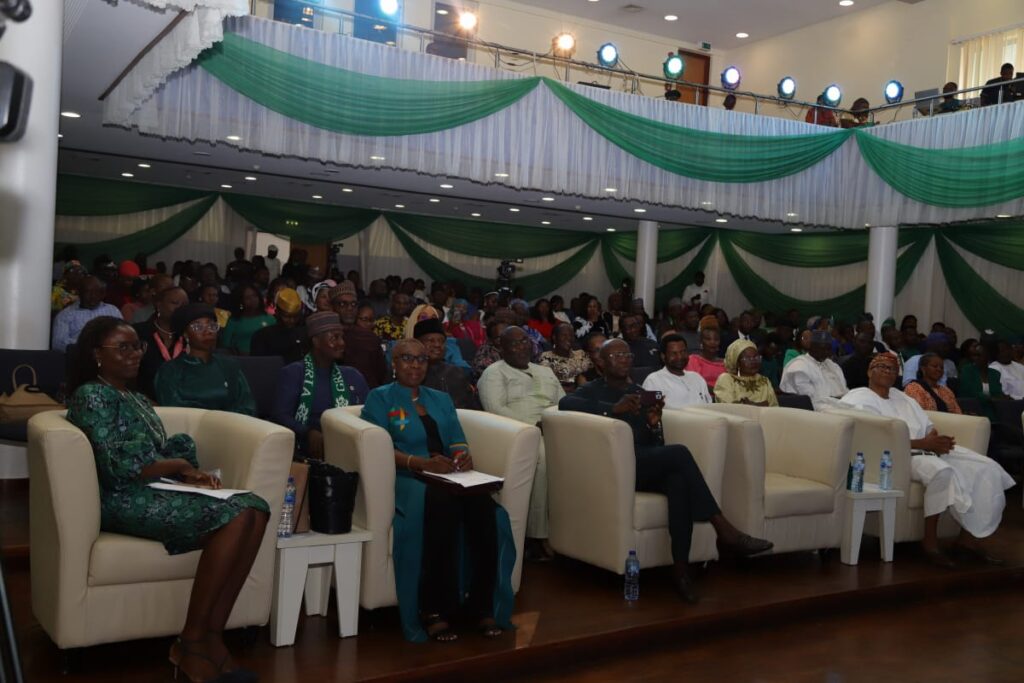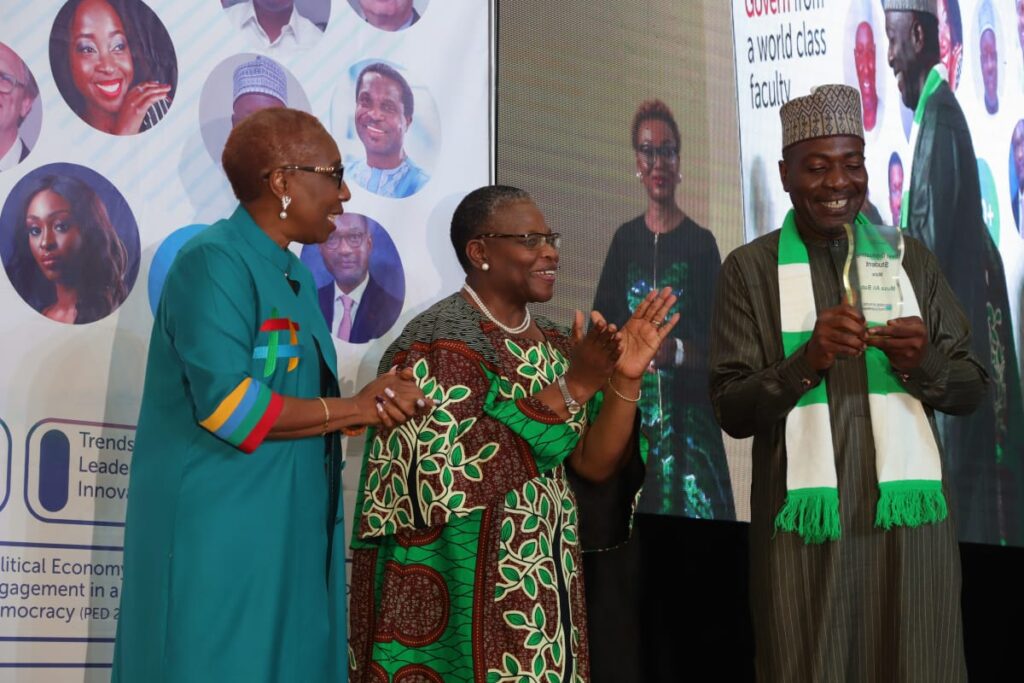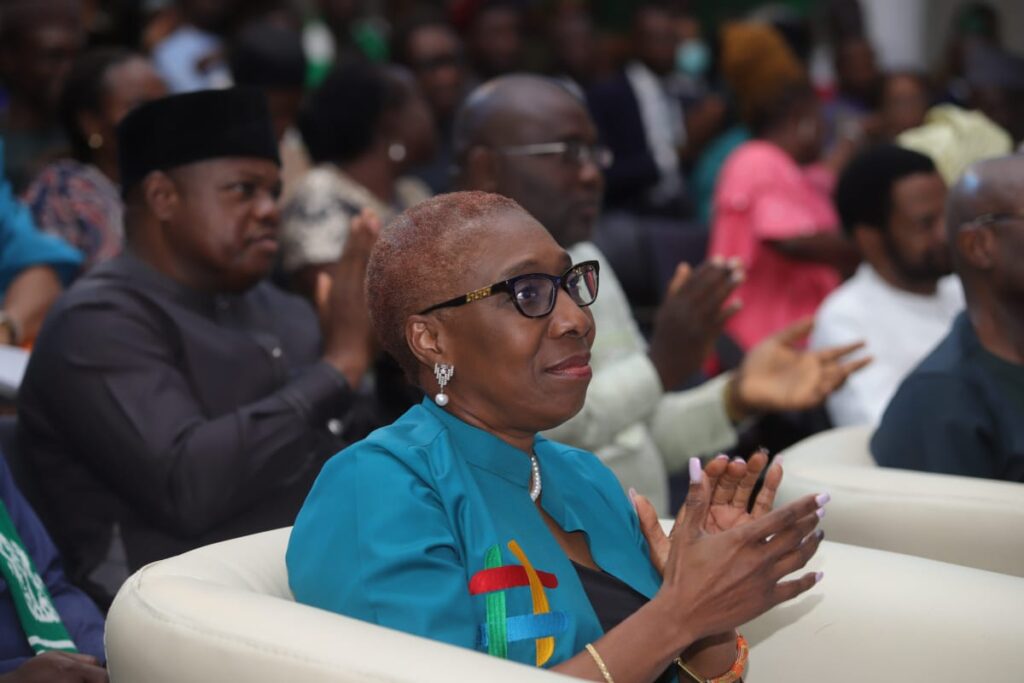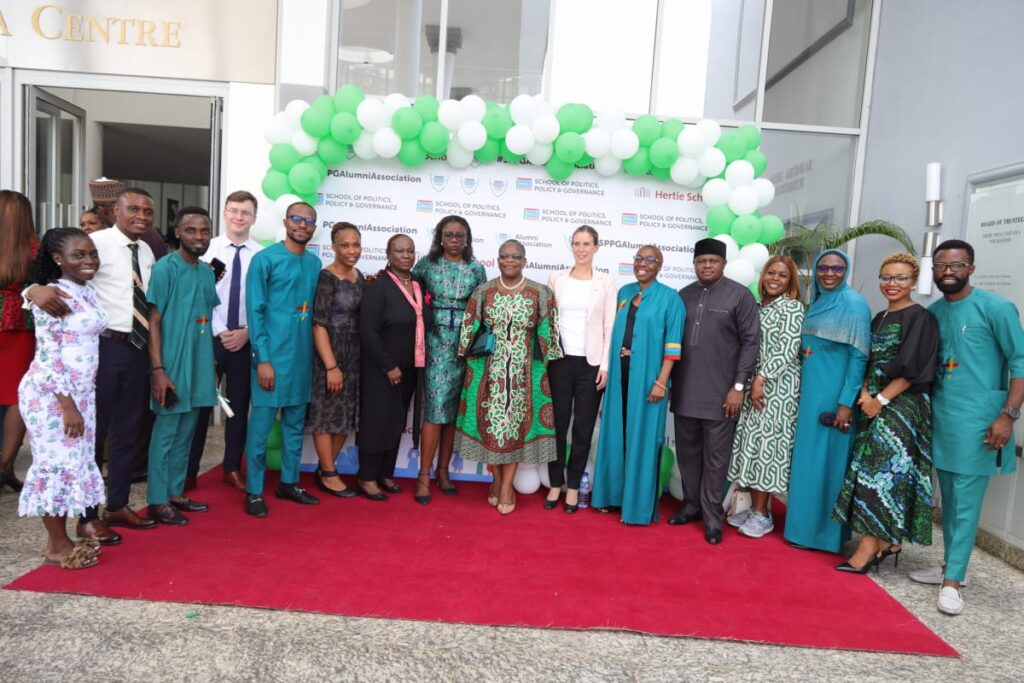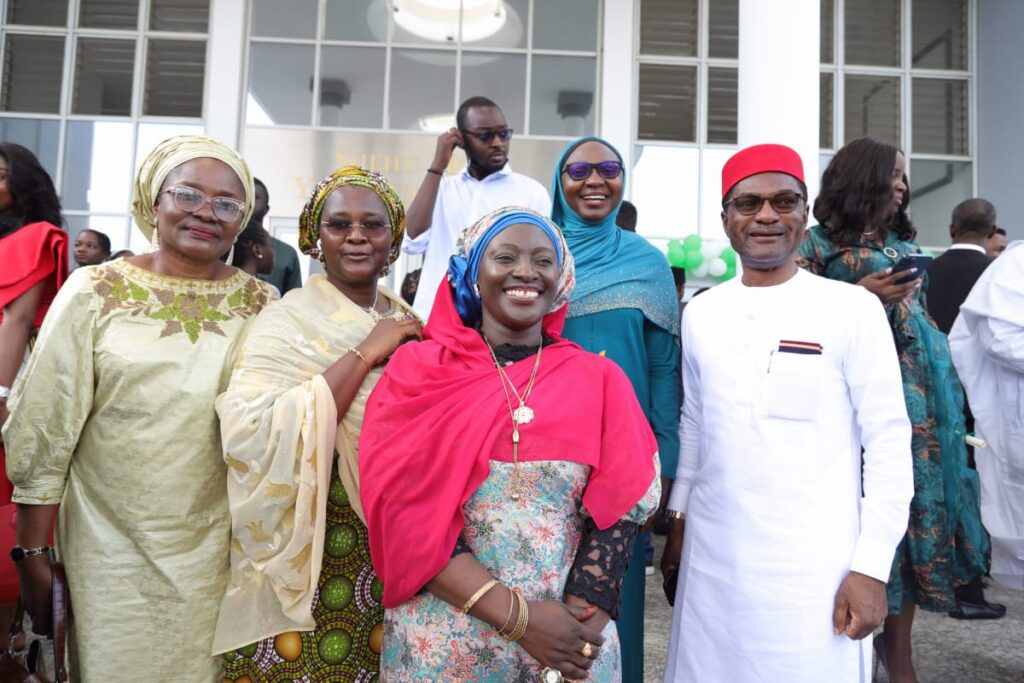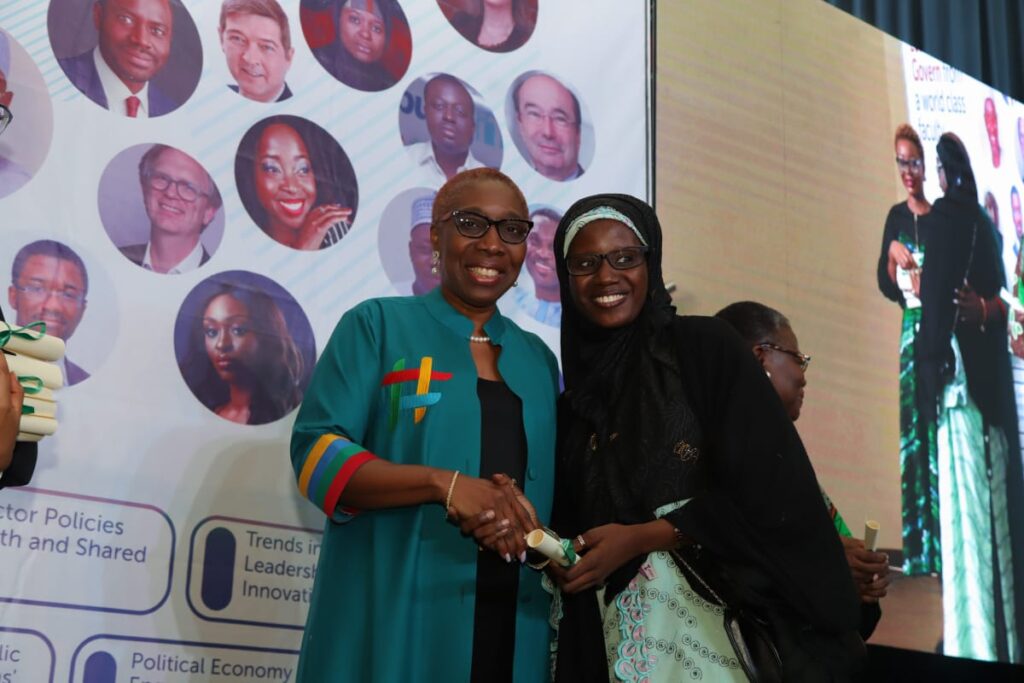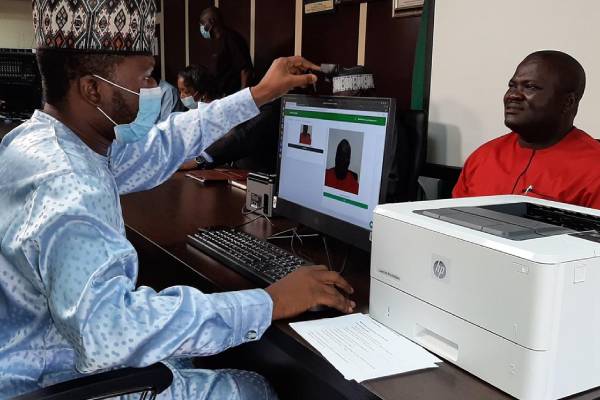Unveiling the Impact of Blockchain Technology on the Educational System: #BigIdeasPlatform2024IsHere
Blockchain is a revolutionary technology that has the potential to revolutionise various industries, including finance, supply chain management, healthcare, and education. Its decentralised, secure, and transparent nature makes it ideal for use in industries where trust, security, and efficiency are of paramount importance. The integration of blockchain technology into the education system has the potential to greatly improve the efficiency, security, and credibility of the educational process. By creating secure and transparent platforms for tracking and verifying students’ academic achievements, blockchain technology can help to create a more accessible and trustworthy education system, making it easier for students to showcase their skills and knowledge to potential employers.
One of the primary benefits of blockchain in education is the creation of a tamper-proof and secure digital transcript. This transcript can store a student’s academic history, including grades, certifications, and other achievements, in a decentralised and secure manner. This can eliminate the need for traditional paper-based transcripts, which can be easily lost, damaged, or tampered with. Another potential benefit of blockchain in education is the creation of a centralised platform for the issuance and verification of digital credentials. This can greatly simplify the process of obtaining and verifying academic credentials, as it eliminates the need for intermediaries to validate them. Additionally, the secure and transparent nature of blockchain can help to prevent fraud, as it provides a reliable and tamper-proof record of a student’s achievements.
Another area where blockchain can have a significant impact is in the area of online education. By incorporating blockchain technology into online learning platforms, educators can create secure and trustworthy systems for delivering and tracking online courses and certifications. This can help to improve the credibility and recognition of online education, making it a more attractive option for students and employers alike. Starting with the general idea, blockchain is a revolutionary technology with the potential to revolutionise various industries, including education. By creating secure and transparent platforms for tracking and verifying students’ academic achievements, blockchain technology can help to create a more accessible and trustworthy education system, making it easier for students to showcase their skills and knowledge to potential employers.
One of the primary challenges hindering the widespread adoption of blockchain in education is the perceived technological complexity. Implementing blockchain-based solutions requires expertise in distributed systems, cryptography, and smart contract development, which may be beyond the capabilities of many educational institutions. Additionally, the regulatory and legal landscape surrounding blockchain technology is still evolving, posing uncertainties and compliance challenges for educational stakeholders. Concerns related to data privacy, intellectual property rights, and jurisdictional issues need to be addressed to ensure the lawful and ethical use of blockchain in education.
Despite these challenges, the integration of blockchain technology holds immense promise for transforming the educational system into a more transparent, secure, and efficient ecosystem. The potential of incorporating this technology into the educational sector in Africa forms the basis of the discussions that we will be having at the Big Idea Platform 2024.
In 2023, The School of Politics, Policy & Governance (SPPG) partnered with the Shehu Musa Yar’Adua Foundation to launch the inaugural Big Ideas Platform, centred around "Reawakening the African Renaissance: Pathways to Inclusive Growth and Development." Five innovative African leaders shared groundbreaking ideas aimed at improving African communities' quality of life. This year , The School of Politics, Policy & Governance (SPPG) is excited to announce Big Ideas Platform 2024, in collaboration with the Shehu Musa Yar’Adua Foundation, on May 25th, 2024. This year's theme, "Information Technology and Behaviour Change," will convene intellectuals, policymakers, technocrats, and changemakers to discuss transformative ideas and solutions for Africa's inclusive prosperity and sustainable development.
The event is open to the public, and registration is free. It will be a great opportunity to learn from thought leaders and professionals about the Use of Blockchain Technology In The Educational System.
Date: May 25, 2024 (Africa Day)
Time: 9:00 AM – 12 PM WAT (GMT+1)
Venue: Shehu Musa Yar'Adua Center, Abuja/ Zoom
Click Here to register for #BIP2024 and stay up to date with event updates.
The Use of Learning tools to Build awareness of Waste Management: #BigIdeasPlatform2024isHere
Solid Waste Management is a multifaceted problem comprising political, socioeconomic, institutional, and environmental aspects. Due to exponential urban growth, it has become one of the most significant issues faced by urban spaces in developing countries. The gap in environmental knowledge among the youth and the old within developing countries contributes to ecological issues or waste management problems, resulting in unsustainable development, with important consequences in low-income countries. Most of the low/middle-income countries are unable to provide effective waste management collection services because of resource constraints, lack of facilities including vehicles, and infrastructure, improper route planning, lack of technical know-how, and inadequate environmental education and awareness. To sustain SW or environmental issues in developing countries, formal education for sustainable development is essential at all levels of education, able to trigger a whole societal transformation. For better environmental sustainability or waste management sustainability education, teachers with the right knowledge, attitude, skills, and innovation, are required.
Awareness plays a pivotal role in shaping individual behaviours and attitudes towards waste management. Lack of awareness often leads to improper disposal practices such as littering, illegal dumping, and indiscriminate waste disposal, exacerbating environmental degradation and pollution. Educating the public about the environmental consequences of improper waste disposal and the benefits of adopting sustainable practices is crucial for fostering responsible behaviour and promoting a culture of waste reduction and recycling. Learning tools, including educational programs, digital applications, and interactive platforms, offer effective means of disseminating information and engaging individuals in waste management initiatives. Educational programs conducted in schools, communities, and workplaces provide structured learning experiences that raise awareness and promote sustainable waste practices among participants. Digital applications and online platforms offer interactive tools and resources, allowing users to access information, track their waste footprint, and participate in recycling programs conveniently.
The search for improved environmental quality has driven several governments in developing nations to adopt the use of Environmental Education in improving the attitude and behaviour of its citizenry towards waste management. One could ask what is the behaviour of undergraduate students towards waste management in Nigeria. Waste management behaviours are all attitude, disposition and perception towards properly disposing of waste in any environment one finds himself. Waste management behaviour includes open dumping, careless attitude towards properly disposing of institutional waste like food wrappers, torn books or papers, hotel food remains, vegetable remains etc. A degraded environment can only offer a degraded quality of life. If we really desire to sustain and improve upon the present quality of life, then it is the collective responsibility of every living human being to secure the quality of the environment.
It has been repeatedly emphasized that there is an irrepressible need for entrenching Environmental Education as a leading approach to solving environmental problems and creating a sustainable society. The poor as well as the affluent are equally vulnerable to environmental damage. The poor and poverty-stricken people, wherever they may live, are generally preoccupied with the issue of physical survival. They lack money, skills and knowledge and therefore oftentimes, tend to over-utilise local resources beyond sustainable levels. They, therefore, need to be empowered to be able to control their resources and therefore their lives according to the tenets of a sustainable, safe and clean environment for healthy living in society.
The implementation of these learning tools to facilitate Environmental Education faces several challenges, including limited access to technology and cultural differences. Additionally, sustaining public interest and engagement in long-term waste management initiatives requires continuous efforts and resources. These implementation methods and challenges form the basis of the discussions that we will be having at the Big Idea Platform 2024.
In 2023, The School of Politics, Policy & Governance (SPPG) partnered with the Shehu Musa Yar’Adua Foundation to launch the inaugural Big Ideas Platform, centered around "Reawakening the African Renaissance: Pathways to Inclusive Growth and Development." Five innovative African leaders shared groundbreaking ideas aimed at improving African communities' quality of life. This year , The School of Politics, Policy & Governance (SPPG) is pleased to announce Big Ideas Platform 2024, in collaboration with the Shehu Musa Yar’Adua Foundation, on May 25th, 2024. This year's theme, "Information Technology and Behaviour Change," will convene intellectuals, policymakers, technocrats, and changemakers to discuss transformative ideas and solutions for Africa's inclusive prosperity and sustainable development.
The event is open to the public, and registration is free. It will be a great opportunity to learn from thought leaders and professionals about how we can Use of Learning tools to Build awareness of Waste Management.
Date: May 25, 2024 (Africa Day)
Time: 9:00 AM – 12 PM WAT (GMT+1)
Venue: Shehu Musa Yar'Adua Center, Abuja/ Zoom
Click Here to register for #BIP2024 and stay up to date with event updates.
About the Big Ideas Platform: The Big Ideas Platform is a thought leadership initiative developed by the School of Politics, Policy, and Governance. With a focus on empowering African innovators and amplifying their voices, this platform aims to promote dialogue, collaboration, and action to address the pressing challenges faced by African communities. By highlighting transformative ideas, the Big Ideas Platform strives to facilitate inclusive growth, development, and the realization of the African Renaissance.
Big Ideas Platform 2024 to Spotlight Bold Ideas in Information Technology and Behaviour Change for Africa's Development
[Abuja – April 22, 2024] – The School of Politics, Policy & Governance (SPPG) in partnership with Shehu Musa Yar’Adua Foundation debuted the first edition of Big Ideas Platform in 2023 under the broad theme of "Reawakening the African Renaissance: Pathways to Inclusive Growth and Development". Five dynamic citizens of Africa whose ideas illuminated bold solutions that can enhance the quality of life in African communities shared a platform to tell a diverse audience the story of their big idea.
This year, we are pleased to announce Big Ideas Platform 2024 in collaboration with the Shehu Musa Yar’Adua Foundation. This thought leadership initiative, taking place on May 25th, 2024, will explore the theme "Information Technology and Behaviour Change".
The event will gather leading intellectuals, policymakers, technocrats, and changemakers to engage in stimulating discussions and showcase bold ideas and disruptive solutions that can propel Africa toward a future of inclusive prosperity and sustainable development.
The Big Ideas Platform is an intellectual convergence of concepts, a marketplace of ideas, where exceptional African minds convene to engage in robust conversations. The platform will facilitate the sharing, generation, and collaboration of fresh ideas, innovative solutions, and implementation strategies to address Africa’s plethora of challenges.
Speaking at the event, Alero Ayida-Otobo, the CEO of SPPG, said, “The Big Ideas Platform is a thought leadership initiative that serves as a platform for launching new thinking, spotlighting visionary individuals, and illuminating bold ideas that have the potential to improve the lives of African communities.”
According to her, the Big Ideas Platform will serve as a catalyst for change, fostering a community of forward-thinking individuals committed to translating ideas into impactful actions that shape the continent’s future.
The Big Ideas Platform 2024 focuses on the crucial role of information technology and behaviour change in propelling Africa towards a better future.
Dr Amina, Faculty of SPPG, said, “We must remember that technology is a tool, and for a sustainable and enduring African Renaissance, we must reconsider how technology is harnessed to drive system change that benefits everyone, helping to shift behaviour from damaging to managing our scarce resources."
Key areas of focus at Big Ideas Platform 2024 will include:
- Blockchain technology: This is premised on immutable records to protect legal tender such as academic certificates and to earn revenue.
- Virtual Reality: A four-dimensional visual experience of hard-to-reach places such as conflict zones to build awareness and empathy and inform accurate urgent action.
- Artificial intelligence: Non-animate machines trained to think and act like humans for humans, for example, identifying fake news.
- Environmental Awareness: Child-centred learning tools to shift children’s understanding of waste and its management to secure wealth and the environment.
Click here to Register
Our lineup of panellists for this year’s edition includes:
Toyosi Akerele-Ogunsiji, EdTech professional and Founder of Passnownow.com; Oluseun Badejo, Team Lead of SPPG Blockchain project; Mrs. Sian (Shan) Cuffy Young, Founder of Siel (Sigh-el) Environmental; and Ahmad Salkida, Investigative Reporter.
The event is open to the public, and registration is free. It will be a great opportunity to learn from thought leaders and professionals, who have the requisite knowledge about improving Africa’s economy and enhancing its development.
Join us, let's co-create the Africa we need.
About the Big Ideas Platform: The Big Ideas Platform is a thought leadership initiative developed by the School of Politics, Policy, and Governance. With a focus on empowering African innovators and amplifying their voices, this platform aims to promote dialogue, collaboration, and action to address the pressing challenges faced by African communities. By highlighting transformative ideas, the Big Ideas Platform strives to facilitate inclusive growth, development, and the realization of the African Renaissance.
SPPG Reflects on the Big Ideas of #BIP2023 and Unveils the Anticipated Big Ideas Platform 2024
The School of Politics, Policy and Governance (SPPG), in collaboration with the Shehu Musa Yar'Adua Foundation, debuted the Big Ideas Platform (#BIP2023) on June 16, 2023 under the broad theme of "Reawakening the African Renaissance: Pathways to Inclusive Growth and Development". Five dynamic citizens of Africa whose ideas illuminated bold solutions that can enhance the quality of life in African communities shared a platform to tell a diverse audience the story of their big idea.
This pan-African intellectual convergence serves as a vibrant marketplace of ideas, bringing together exceptional minds to address the continent's challenges and chart a path towards inclusive growth and development.
Big Ideas Platform 2023: A Recap of Big Ideas of Forward-Thinking Africans Shared in 2023
Five dynamic citizens of Africa whose ideas illuminated bold solutions that can enhance the quality of life in African communities shared a platform to tell a diverse audience the story of their Big Ideas.
Here is a recap of the Big Ideas platformed in 2023:
-
Amal Hassan, Founder/CEO of Outsource Global, emphasized the significance of Business Process Outsourcing (BPO) as a pivotal economic catalyst. She underscored BPO's role in generating millions of jobs in India and highlighted Nigeria's potential to replicate this success. With robust infrastructure, a skilled workforce, and a constant influx of graduates with diverse skill sets, Hassan suggested that Nigeria has the capacity to harness BPO opportunities, cater to global demands while retaining her youths.
-
Adetola Onayemi, CEO of Norebase, highlighted the stark disparity between Africa's population share of 15% and its GDP contribution of only 3% globally. He emphasized the urgent need for strategies to bolster Africa's GDP and advocated for initiatives that not only foster continental prosperity but also contribute to the growth of global GDP, hence his big idea on Borderless Business
-
Ijeoma Akwiwu, Co-founder/COO of Pivo Africa, presented her big idea of building an end-to-end financial operating system for Africa's supply chain. Reflecting on the unprecedented challenges posed by the COVID-19 pandemic, Akwiwu underscored its profound impact on individuals and businesses, highlighting the urgent need for resilient financial systems capable of mitigating disruptions, hence her big idea.
-
Hamzat Lawal, Founder of CODE and Follow the Money, addressed the concept of "Factivism," combining activism with data-driven facts. Lawal recounted the tragic narrative of lead poisoning in Zamfara, where 700 children lost their lives and 1500 were left sick. He detailed how the #SaveBadega campaign, rooted in factivism, garnered significant attention and spurred governmental action in response to the urgent crisis.
-
Samson Ogbole, Farmer at Soilless Farm Lab, spoke on "Soilless Farming" for sustainable agriculture. Drawing attention to the aging demographic of Nigerian farmers, with an average age of approximately 60 years, Ogbole highlighted the concerning lack of interest among young people in agricultural pursuits. He emphasized the urgency of involving youths in agriculture to address the imminent challenge of an aging farming population and the adoption of soilless farming to ensure food security for the future.
These insightful discussions shed light on various critical themes, generating valuable insights and fostering a sense of shared purpose.
Big Ideas Platform 2024 is here!
[Click her to Register]
This year, our focus is on information technology and behaviour change. We invite you to join a panel of speakers addressing a diverse audience of policymakers, advocates, captains of industry, youth, schools, and community leadership on your insight. It is noteworthy to mention that this year, Toyosi Akerele, who as you know is a leading AI in public interest unicorn is a guest speaker at the Big Ideas Platform 2024.
Register now for #BIP2024 on our website: https://thesppg.org/bip2024
About the Big Ideas Platform: The Big Ideas Platform is a thought leadership initiative developed by the School of Politics, Policy, and Governance. With a focus on empowering African innovators and amplifying their voices, this platform aims to promote dialogue, collaboration, and action to address the pressing challenges faced by African communities. By highlighting transformative ideas, the Big Ideas Platform strives to facilitate inclusive growth, development, and the realization of the African Renaissance.
Join us for the phenomenal #SPPGClassof2023 Graduation Week
We are thrilled to invite you to join us at the School of Politics, Policy, and Governance Graduation Ceremony and Africa Conference 2023.
After a rigorous but rewarding transformative journey of 10 months, the #SPPGClassof2023 has experienced a remarkable journey of growth, invaluable knowledge exchange from our global faculty, capstone mentors, and peers, as well as outstanding accomplishments, which is why we are pleased to celebrate their steadfast dedication to transformative political and public leadership.
This year, the inaugural edition of the Africa Conference 2023 debuts as part of the graduation ceremony for #SPPGClassof2023. It promises to be a historic gathering that assembles African value-oriented governance and citizen movements to connect, learn from each other, and build a lasting network of disruptive leaders in the public space, ready to shape and influence the future of governance in their respective countries and throughout the continent.
We are excited to bring the line-up of activities marking the #SPPGClassOf2023 Graduation Event to your notice. It promises to be a remarkable experience. One you wouldn’t want to miss.
Kindly find the details below:
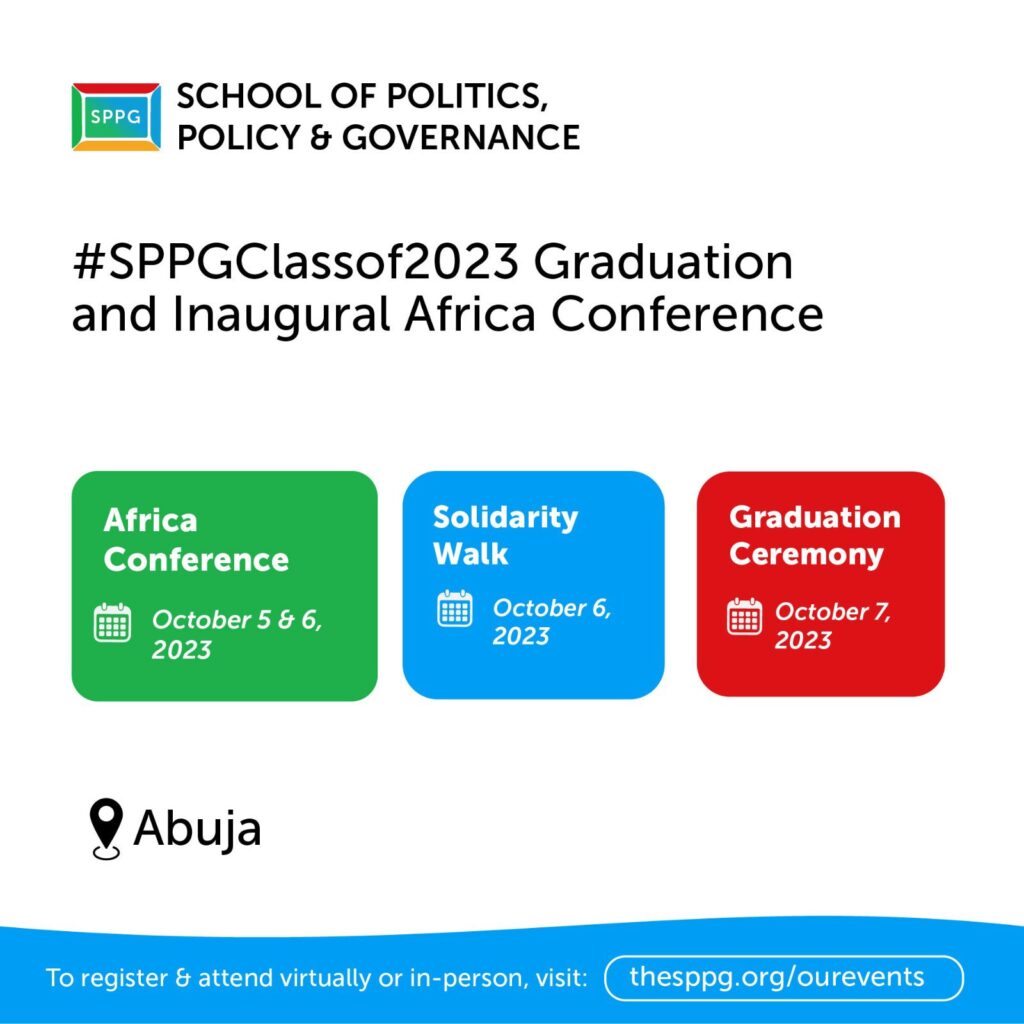
1. The Africa Conference:
https://www.youtube.com/watch?v=4Fk9QIgK2Fs
The Africa Conference will bring together disruptive political and community leaders, SPPG students and alumni, and the #FixPolitics WSG Community. We will explore the significance of citizen-led movements, their impact on African governance, and their crucial role in the continent's renaissance.
Day 1: The first day of the event will focus on the theme "Governance and Political Trends in Africa: An Overview of Citizen’s Movement and their impact
Date: October 5th, 2023
Time: 10:00 am -5:00 pm WAT
Venue: Shehu Yar’Adua Center, Abuja
Day 2: The conference continues with feedback sessions, where participants will share the outcomes of their discussions from the previous day and work towards actionable solutions.
Date: October 6th, 2023
Time: 12:00 pm- 3:30 pm WAT
Venue: Shehu Yar’Adua Center, Abuja
2. Graduation Ceremony:
https://www.youtube.com/watch?v=keO_ACb0jeU
The events will culminate in the graduation ceremony recognizing the achievements of the #SPPGClassof2023 and celebrating their journey towards becoming values-driven, disruptive leaders.
Date: October 7th, 2023
Time: 10:00 am -3:00 pm WAT
Venue: Idris .A. Abdulkadir Auditorium, National Universities Commission, 26 Aguiyi Ironsi, Maitama, Abuja.
Please RSVP for each event you plan to attend via the registration link below:
Attendance is free, but registration is compulsory.
Click here to RSVP for both events.
School of Politics, Policy, and Governance Opens Applications for Class of 2024
The School of Politics, Policy, and Governance is excited to announce that the application process for the Class of 2024 is now open. As an unconventional school, the School of Politics, Policy, and Governance aims to build a massive base of disruptive thinkers in the political sphere, equipping them with the knowledge and skills necessary to address complex development issues. This sustainable approach to cultivating a new value-based political class focuses on identifying, recruiting, training, deploying, and monitoring citizens in public leadership positions.
In a democracy, strong institutions, socioeconomic stability, and the rule of law are fundamental pillars. However, active citizen participation, an informed electorate, and citizen control of the agenda play an even more crucial role in creating a healthy and inclusive democracy. The School of Politics, Policy, and Governance recognizes that an empowered and engaged electorate is essential. To achieve this, it is necessary to restore meritorious democracy and create an enabling environment for an inclusive civil society, where citizens are encouraged to act in the public interest.
Leadership requires more than good intentions and a passion for service, especially in navigating the complexities of leading a great nation like Nigeria. The School of Politics, Policy, and Governance seeks leaders who share a common template for redeeming Nigeria's democratic heritage—leaders who are ready to participate in the political process from the inside rather than the outside and make a tangible difference.
Students of the School of Politics, Policy, and Governance are awarded a Certificate in Public Leadership and Policy (CPLP) upon graduation. This ten-month curriculum comprises carefully selected courses that are analytically and empirically relevant to solving Africa's complex development problems. With a diverse global faculty, the school ensures students receive the highest quality education in politics and policy, preparing them for the challenges ahead.
The entire application process for the School of Politics, Policy, and Governance is conducted online. As a 100% virtual program, successful applicants can attend classes from anywhere in the world, providing flexibility and accessibility.
Who can apply? All applicants must hold a minimum educational qualification of a B.Sc or HND/BA. They must demonstrate a commitment to public leadership, and the ability to showcase successful project execution will be an advantage.
Application Requirements: Applicants are required to upload the following documents to the online application portal:
- Academic qualification (BA, B.Sc, or HND)
- Master's or any other Post Graduate Certificate (if applicable)
- Personal Statement (Maximum – 750 words)
- Curriculum Vitae (Maximum – 2 pages)
- Details of 2 recommenders (peers, community leaders, or employers who have known the applicant for a minimum of 6 months and can vouch for their character and suitability for the program)
Application Deadline: The application period for the SPPG Class of 2024 is open from April 17th, 2023, to September 30th, 2023. Incomplete applications lacking recommendation letters may experience delays or disqualification.
To learn more about the School of Politics, Policy, and Governance and the application process, please visit thesppg.org.
As African Citizens Emerge as Innovators, the Big Ideas Platform Shines a Spotlight on Bold Visionaries
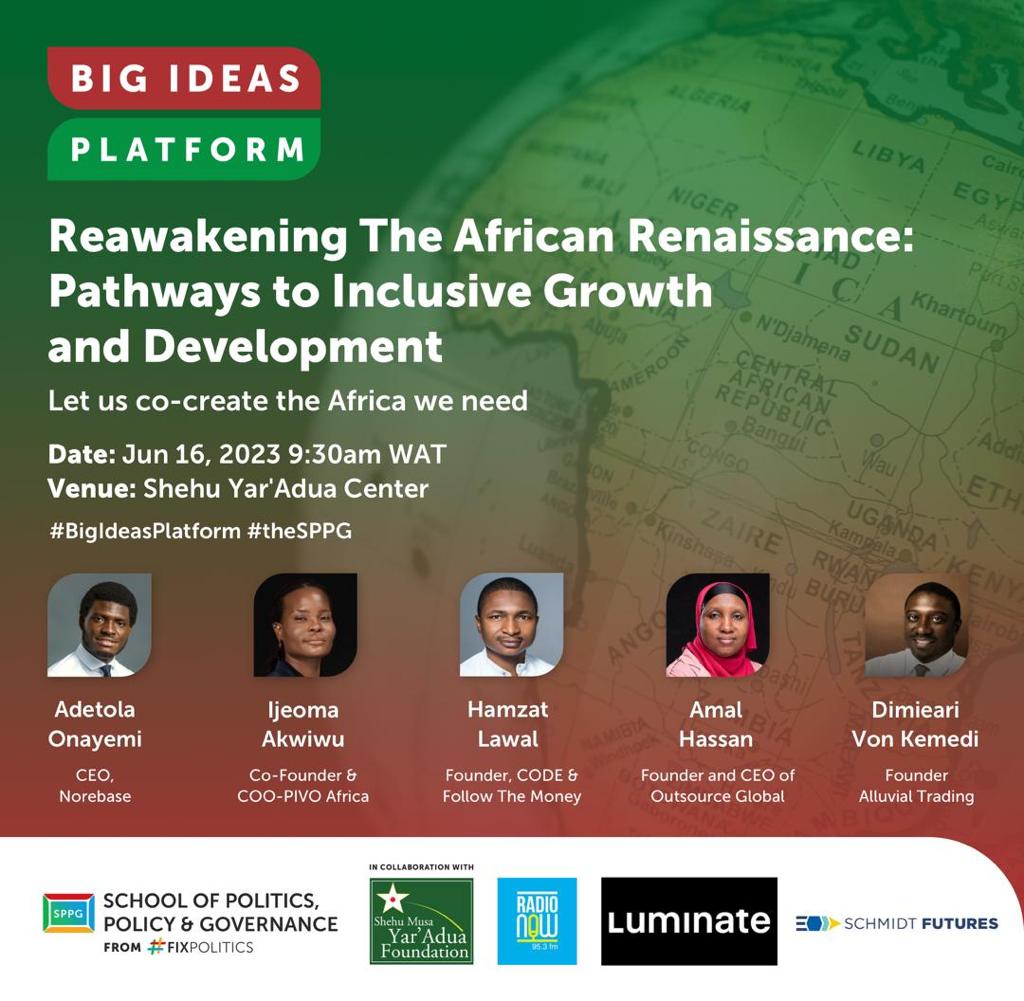
[Abuja, 7th June] – African citizens are continuously generating groundbreaking ideas across various sectors, offering fresh and profound perspectives on the challenges faced by over 1.3 billion Africans. To ensure these ideas are heard, reflected upon, and have the potential for implementation, advocates, policymakers, business leaders, and citizens must come together to amplify their power of imagination and ingenuity.
The Big Ideas Platform, an innovative thought leadership initiative by the unconventional School of Politics, Policy, and Governance, aims to showcase individuals who have dared to dream. It seeks to shed light on bold ideas that have the potential to enhance the quality of life for African communities. By providing a platform for these visionaries, the Big Ideas Platform aims to foster dialogue, collaboration, and action towards meaningful change.
We are excited to announce the maiden edition of the Big Ideas Platform, where we will address the theme: "Re-awakening the African Renaissance; Creating Pathways to Inclusive Growth and Development." This groundbreaking event will take place on June 16, 2023, at the prestigious Shehu Musa Yar'Adua Center in Abuja.
The Big Ideas Platform brings together a diverse group of forward-thinkers, influencers, and change-makers who are passionate about shaping Africa's future. By providing a platform to amplify their voices, this event will encourage meaningful conversations, facilitate knowledge sharing, and foster collaborations that have the potential to drive inclusive growth and development across the continent.
During the event, attendees will have the opportunity to engage with a distinguished panel of experts and thought leaders who will share their insights and experiences in addressing the critical challenges facing African communities. Through thought-provoking discussions, keynote speeches, and interactive sessions, participants will gain valuable knowledge and inspiration to drive positive change in their respective fields.
The Big Ideas Platform invites individuals from all walks of life to be part of this transformative event. Whether you are a seasoned policymaker, a budding entrepreneur, an academic, or a passionate advocate for change, your participation is crucial in shaping the future of Africa. We encourage you to register for the event using the link below, indicating whether you prefer physical attendance at the Shehu Musa Yar'Adua Center or virtual participation from the comfort of your location.
About the Big Ideas Platform: The Big Ideas Platform is a thought leadership initiative developed by the School of Politics, Policy, and Governance. With a focus on empowering African innovators and amplifying their voices, this platform aims to promote dialogue, collaboration, and action to address the pressing challenges faced by African communities. By highlighting transformative ideas, the Big Ideas Platform strives to facilitate inclusive growth, development, and the realization of the African Renaissance.
Late-admission window into the #SPPGClassof2023 is open and closes on October 22nd 2022
Late-admission application window into the #SPPGClassof2023 is open and closes on October 22nd 2022
The SPPG, School of Politics, Policy and Governance, established in 2020, is building a pipeline of a new and disruptive-thinking political class with a mission to transform the quality of political and public leadership in Nigeria and the rest of Africa. The School is a unique Public Leadership Preparation initiative.
The SPPG educates present and future leaders that are committed to public good and who are ready to serve as stewards of the well-being of all Nigerians. The School delivers an unconventional multidisciplinary curriculum that is aimed at producing a massive base of ethical, competent and capable public leadership with the requisite knowledge and skills to solve complex development problems in our country and continent.
So far, SPPG has graduated 2 cohorts of students as #PioneerClassof2021 (160) and #Classof2022 (133). Consistent with the mission of TheSPPG.org, upon graduation, many of our students run for elective offices across various parties while others pursue leadership careers in the public and private sectors as well as civil society.
In furtherance of our mission and commitment to equity and diversity, we have decided to open a Late Admission Window for those who wish to apply to the #Classof2023. The deadline for applications using the Late Application Window is extremely tight and ends on October 22, 2022. Admission to the SPPG is highly competitive through a rigorous selection process conducted entirely virtually.
To apply, visit thesppg.org .
Who can apply?
- All applicants must have a minimum educational qualification of a B.Sc or HND/BA.
- Applicants must be able to demonstrate commitment to public leadership.
- The ability to demonstrate the successful execution of projects will be an advantage.
- What you need to apply
- Applicants are required to upload the following to the online application portal:
- Academic qualification (BA, B.Sc or HND).
- Master or any other Post Graduate Certificate (if applicable).
- Personal Statement (Maximum – 750 words).
- Curriculum Vitae (Maximum – 2 pages).
- Details of 2 recommenders (peer, community leader or employer who must have known you for a minimum of 6 months and can vouch for your character and suitability for this program).
Application Deadline
To fast-track the admissions process, applicants are expected to fulfil all admission requirements on or before October 22 2022.
Limited scholarship slots are available. Terms and conditions apply.
Incomplete applications (applications without recommendation letters) will be disqualified.
To learn more about the School of Politics, Policy and Governance, visit thesppg.org.
SPPG Graduates 133 new disruptive thinking leaders in 2022
In a bid to produce the next generation leaders with disruptive thinking, School of Politics, Policy & Governance, (SPPG) over the weekend held a graduation ceremony for 133 students for the 2022 academic year in Abuja Nigeria.
At the 2022 graduation ceremony of the School of Politics, Policy, and Governance with the theme: “Designing Our Global Future with Africa in Mind” held at the Shehu Musa Yar’dua Centre, Abuja, were Chairman, FATE Foundation, Fola Adeola, former Minister of Information & Culture, Frank Nweke Jr., former Minister of Education/founder SPPG, Oby Ezekwesili, US Ambassador to Nigeria among others.
Speaking at the ceremony, Chief Executive Officer of SPPG, Alero Ayida-Otobo, said the institution was designed to transform the quality of political and public leadership in Nigeria and the rest of Africa.
She disclosed that the 2022 graduating class comprised 133 students who underwent 10 intensive months of training and learning.
“For the class of 2022, about 133 students are graduating. The pioneer class was 160, and they have gone through 10 intensive months of training and learning. They studied 140 topics and seven thematic areas. Research shows that there were certain gaps in the knowledge base of many public leaders. So, this is our own contribution to building the knowledge base of future leaders, and we are very pleased that we have 133 graduates.
“A lot of them are already doing great work. They are already community organisers serving at the community level and recruiting individuals that have the potential to be part of our community. Among them, we have at least 5 that scale through the primaries conducted by parties.
“Our 10 months course stretches and strengthens one’s leadership capacity, and our students who were aspirants demonstrate that what we are teaching is not just possible, but we have people running the race already”.
Meanwhile, former Minister of Education, Dr. Obiageli Ezekwesili, has linked the root cause of Nigeria’s leadership problem to distorted political culture where leaders place personal interests above the public good.
According to her, there must be a change of mindset by leaders to tackle the growing economy and security challenges in the country.
Ezekwesili, who is also the founder of SPPG, observed that character, competence and capacity was the missing link in producing good leaders in the African continent.
She, therefore, stressed the need for disruptive thinking in the nation’s political space.
She said: ” We found that not just in Nigeria, but across Africa, there is a distorted political culture.
It’s the political culture where those in public leadership subordinate the public good. That is the common good for their personal and narrow interests. And so, what it means is that the common good and public good is not served by people who should be serving. So, to correct that, you have to customize a new leadership mindset.
“So, the training that we gave at the School of Politics, policy and governance has the content to reset the mindset of those who wish to lead in public service.
“They lead by serving, they place character at the foundation of the knowledge that we give to them by improving on their competency and the capacity for them to be able to articulate sound policies, be able to design institutions that enable society to advance and to have the capacity to make the right choices of investment in the goods and services that countries need in order to grow”.
The ex-Vice President for the World Bank’s Africa Region, said ahead of the 2023 elections, such distorted political culture could be corrected with sufficient information on the part of the Nigerians.
According to Ezekwesili, there is a need to educate and sensitize the citizens on the consequences of making bad decisions during elections.
“I think that one of the things that our research shows is the important role of citizens, which is why a critical pillar in the research of fixed politics is the pillar on empowering and enlightening the electorate so that they would have enough influence sufficient enough to influence political outcomes. So, the role of the citizens in democracy is part of what the SPPG promotes and again, we must have the office of the citizen, the community organizing approach, and all the other things that lead towards an empowered citizen that can push back and demand accountability as well as the emergence of the right kind of leadership for our public space”, She added.
Former US Secretary of States, Hillary Clinton, in a short video message, stressed the need for Nigerians to vote during elections, noting that participating in electioneering activities would strengthen the nation’s democracy.
The best graduating students are Joyce Daniels- female and Musa Ali Baba- male.
SPPG Group 7 launch the Perfect Seven Project to resolve voter apathy and increase citizen participation in the electoral process
SPPG Pioneer Class 2021 Group 7, for their SPPG Capstone project, launches the perfect seven projects to resolve voter apathy and increase citizen participation in the electoral process.
Since the return to electoral Democracy in 1999, elections in Nigeria have been characterised by voters’ apathy. Only a small percentage of eligible people vote. For instance, in 2019, the Independent National Electoral Commission’s record revealed 82.3 million registered voters nationwide; during the presidential election day, only 28.6 million (a mere 35%) voted. The elected President received his mandate for a second term on the strength of votes cast by a paltry 18.5% (15,191,847) votes.
Chechet Benjamin Andrew, Ojoshide Isabel Ugbaje, Okon Glory, Timkat Nanmak Peter, Collins Okeke, Aderemi Yusuf Adewale, Dele David Ogunsoto, Omotola Adeyoju Ilesanmi, Mary Uche Emmanuel-Okorie, Chiezugolum Ijeoma Odilinye, Gold Soni Ugochi and Ode Debra Achugwu, all members of SPPG Pioneer Class Group 7 for their capstone project, launched the perfect 7 Project to increase citizen participation in the electoral process.
This project is designed to change the depressing narrative of voter apathy and galvanise the Nigerian electorates to participate actively in large numbers in the electoral process. Not just to vote but also to hold elected candidates accountable for their stewardship.
According to Group 7, “The primary target group are people aged 18+. They are people within the eligible voters range, directly influencing the outcome of an election. If they do not make informed decisions or participate in the electoral process and governance, we can achieve little or no change. According to Worldometer (October 2021), Nigeria's population of about 211 million people, about 50% are, aged 18 and above. According to INEC, there were about 84 million registered users. However, elections do not reflect these numbers, as less than 20% voted in 2019. this figure has further fallen, as we’ve observed in state and local elections. Nigeria’s population is growing at a rate of 3.2% per annum. It is estimated that the population of Nigeria will be 402 million by 2050, of which the youths make up 60%. Therefore, we are also targeting teenagers who would be turning 18 in the next two election cycles.”
To achieve the goal of the project, the Group produced video skits in different Nigerian languages designed to create a mind reorientation and move Nigerian citizens from political apathy to participation.

Video 1 -> Politics is Life, Get your PVC -> https://youtu.be/9xpL67RL3zk

Video 2 -> Politics is Life, Get your PVC in Yoruba Language version 1 https://youtu.be/6Tm1AvflsFU

Video 3 -> Politics is Life, your PVC in Yoruba Language version Get 2 https://youtu.be/OCM1LdFG2nI
The Group distributed the productions across different media platforms.
The next phase of the project is to track the number of citizens who obtained their Personal Voter Card (PVC) and voted in an election as a result of our messages and to move Nigerians to imbibe, own and act on the Group's slogans: “Politics Is Life”, “Oro Oselu Se Koko”, “Politics Na Life.”
The Group hopes this becomes a life-long project that will go beyond group 7 of SPPG Pioneer Class. According to group 7, the issue of voter apathy and citizen participation will be solved through a marathon, not a sprint. The goal is to take measured and concrete steps that lead us to our goal, and we would evaluate the impact of each step and readjust our strategy.
They have plans to engage like-minded members from subsequent cohorts of the SPPG. These fresh, vibrant members, like fresh logs of wood, will spike the fire and keep it burning into eternity.



